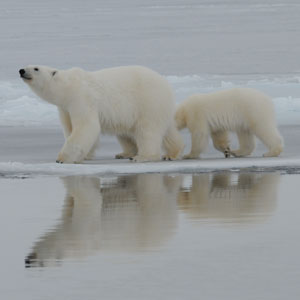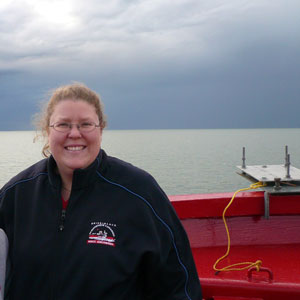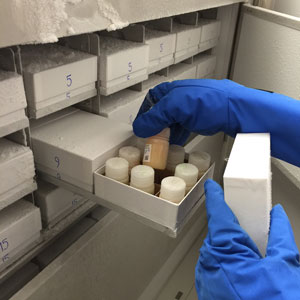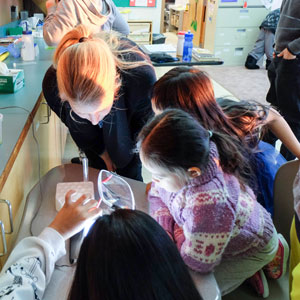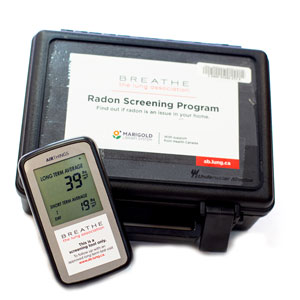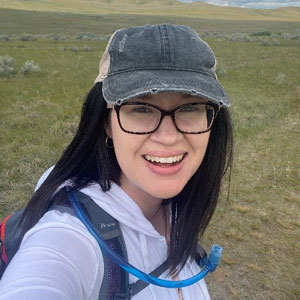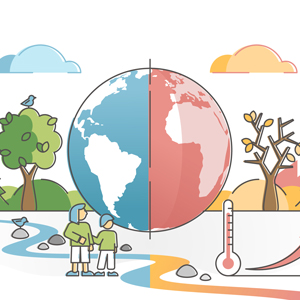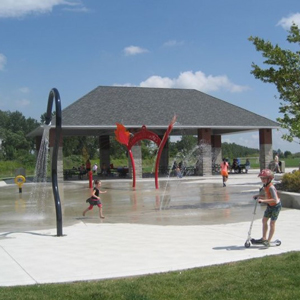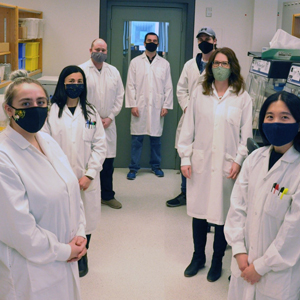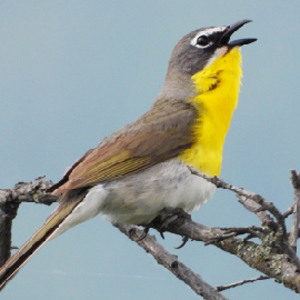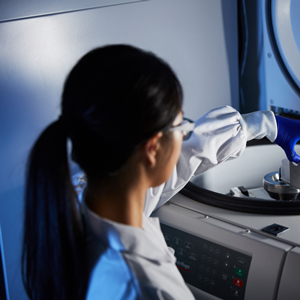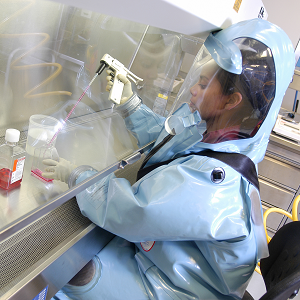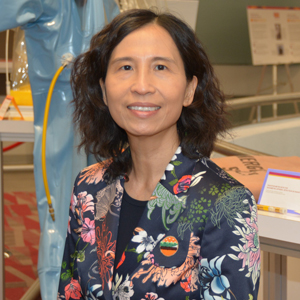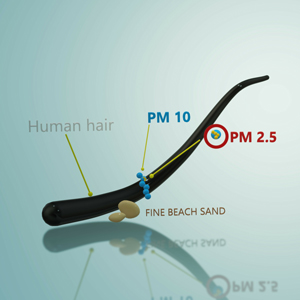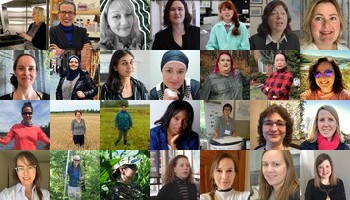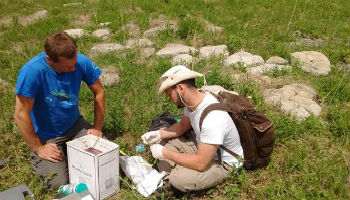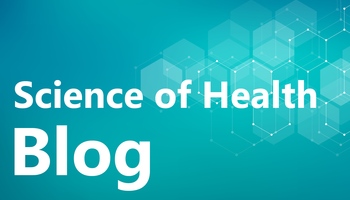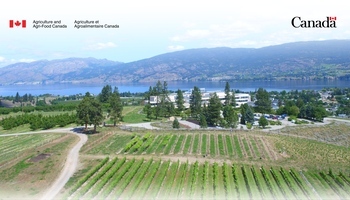Growing up is hard to do: Chemical exposure and teenagers
December 20, 2021 | from The Science of Health
Stressed orchards lead to injured AmbrosiaTM apples
December 17, 2021 | from The Science of Summerland
Arctic Science Series: Seawater Monitoring in the Arctic
December 14, 2021 | from Science Behind the Scenes
Environment and Climate Change Canada (ECCC) researchers have been studying contaminants in the Arctic through the Northern Contaminants Program run by Crown-Indigenous Relations and Northern Affairs Canada since the early 2000s. In recent years, the Community-based Monitoring of Seawater in Nain, Nunatsiavut began as a joint project between ECCC researchers and the Nunatsiavut government.
Tic Tac Tot: Examining chemicals exposure in preschoolers
December 13, 2021 | from The Science of Health
Math saves lives: How scientists use modelling to guide COVID-19 decision-making
December 10, 2021 | from The Science of Health
For those of us who struggled through high school math classes, it’s hard to imagine it could actually be used to save lives! But that is exactly what scientists at the Public Health Agency of Canada’s (PHAC) National Microbiology Laboratory (NML) are doing—using data analysis to create forecasts based on mathematical models.
Arctic Science Series: Passion for the Polar Bear
December 7, 2021 | from Science Behind the Scenes
Bringing baby home
December 6, 2021 | from The Science of Health
Arctic Science Series: Contaminant Monitoring in the Arctic Archipelago
December 1, 2021 | from Science Behind the Scenes
Research Scientist, Dr. Liisa Jantunen, explains that it is important to study contaminants as many accumulate in the Arctic where levels of concentration can be higher and long-term impacts are unknown. “Certain substances are considered forever chemicals as it is hard for the environment to break them down,” she says.
Here we grow again: How Health Canada researchers are learning more about chemical exposure during pregnancy
November 29, 2021 | from The Science of Health
Growing Knowledge: How Health Canada is going the distance to study human impacts of chemical exposure
November 19, 2021 | from The Science of Health
Group A Strep: unravelling the mysteries of a common germ
November 18, 2021 | from The Science of Health
Have you ever been worried that you had strep throat? Maybe you had to miss school, or cancel a date, and go see the doctor. You might have wondered how you got sick and whether you could pass your illness on to others. The Public Health Agency of Canada (PHAC)’s National Microbiology Laboratory (NML) is working to answer these questions by tracking and analyzing Group A Strep infections to understand how the disease is changing and how best to support regional labs during outbreaks.
Inuit Knowledge, Science and ECCC: collaborations for better understanding of northern ecosystems
November 2, 2021 | from Science Behind the Scenes
Turning the page on Radon: Radon Monitor Library Lending Program
November 1, 2021 | from The Science of Health
When we think of our public library, we think of rows and rows of books. However, libraries are much more; they are a central point of information sharing, a hub of knowledge and a pillar of support in communities. Sharing knowledge and responding to local need is how libraries across Canada got involved in the Radon Monitor Library Lending Program.
Research reveals raspberries could support health and help diabetes
October 29, 2021 | from The Science of Summerland
Meet the Outbreak Management Division at the Public Health Agency of Canada
October 29, 2021 | from Canadian Women in STEM
The Outbreak Management Division (OMD) at the Public Health Agency of Canada (PHAC) consists of a team of highly qualified individuals from different backgrounds that assess, detect and coordinate investigations of enteric illness outbreaks (e.g., Salmonella, E. coli, Listeria) occurring in multiple provinces and territories in Canada, or at least one province or territory and another country.
Unravelling the mystery of food-borne illness outbreaks: Disease detectives search for clues in the data
October 29, 2021 | from The Science of Health
Breathing easy in port cities: reducing the impact of marine shipping pollution?
October 29, 2021 | from The Science of Health
Can you stand the heat?
July 29, 2021 | from The Science of Health
COVID-19: Examining the National Microbiology Laboratory’s Role in Serology Testing
July 6, 2021 | from The Science of Health
Is there a monster under the bed?
June 21, 2021 | from The Science of Health
Stay Curious: Advice from a Leader Who Continues to Support People
June 17, 2021 | from Canadian Women in STEM
"In my view, I have always worked in leadership and support to operations, and it is just the nature of the operation that has changed. Where before the operation was military operations or ship building and repair, and now the operation I need to support is critical scientific research. The other constant is leading and supporting people. That part of the job is a constant."
Learn Something Every Day: Advice from a Lifelong Engineer Working Behind the Scenes
June 17, 2021 | from Canadian Women in STEM
Point-of-care testing brings rapid COVID-19 testing to underserved communities
June 17, 2021 | from The Science of Health
When hit with a pandemic such as COVID-19, northern, remote and isolated communities in Canada can be particularly vulnerable. These communities are home to many First Nations, Metis and Inuit peoples who have historically experienced obstacles and challenges with equitable access to health care services.
Why there’s no monkeying around on extreme heat
June 15, 2021 | from The Science of Health
Health benefits of fruits and vegetables discovered ‘locked’ to plant cell walls
June 11, 2021 | from The Science of Summerland
Brand new research for brand new food environments
June 7, 2021 | from The Science of Health
Staying close to home: Impact of public health measures on air pollution
June 2, 2021 | from The Science of Health
For those living in large urban centres, sitting in bumper-to-bumper traffic used to be part of the daily grind. But since the COVID-19 pandemic forced many people to telework, traffic patterns have changed drastically. Has this had an impact on the air quality and air pollution in our cities? Scientists Keith Van Ryswyk and Eric Lavigne from Health Canada set out to find out!
A National Collaboration Resource for Public Health
June 1, 2021 | from The Science of Health
As Canadian public health experts continue to adapt and respond during the COVID-19 pandemic, the importance of established partnerships in public health has never been clearer. These experts coordinate to share knowledge and support each other so that they can continue producing the best science for Canadians and remain research leaders in the world.
Harnessing the power of wastewater testing to detect COVID-19 outbreaks
May 20, 2021 | from The Science of Health
The Deets on DEET: What parents should know about Health Canada’s latest research on insect repellents for kids
May 18, 2021 | from The Science of Health
For many of us, summer means making the most of our great Canadian landscape. Trips to the beach, picnics, backyard barbecues, hiking trails, and children’s summer camps are great ways to enjoy the best of our weather and our wonderful natural resources. However you enjoy the great outdoors, there’s a good chance you use bug spray to cope with those tiny unwanted guests who show up to spoil the fun. The only thing that ruins a barbecue faster than rain is a swarm of mosquitoes!
Collaboration key to continuing field research during COVID-19
May 5, 2021 | from Science Behind the Scenes
British Columbia-based ECCC Research Scientist, Christine Bishop, has collaborated with the En’owkin Centre in the Okanagan Valley in the interior of the province for the last twenty years to advance their mutual interest in the conservation of the Western Yellow-breasted Chat. Despite not being able to travel to Penticton in 2020, Christine says the strong foundation in partnership between the two organizations, combined with an adaptive field work protocol, empowered the En’owkin Centre to continue the research project. “When you have a long-term database, you might think one year is just another dot on the graph,” she says. “But it’s actually really important, when you are talking about wildlife populations, to be able to track them from one year to the next because things can change a lot between years.”
The Q&A of QA: how the NML uses Quality Assurance to produce quality research
March 15, 2021 | from The Science of Health
Running a world-class research facility involves a lot of precision and expertise. Have you ever wondered how facilities like the Public Health Agency of Canada’s (PHAC) National Microbiology Laboratory (NML) produce trusted work? The answer lies in part with the brilliant scientists who conduct the research, but also relies on a team of expert support staff who maintain a workplace with strict technical measures at every turn to ensure a quality outcome
Big questions about tiny particles
March 8, 2021 | from The Science of Health
Understanding the effects of new products and technologies is increasingly important in our fast-paced world. By understanding the potential health impacts of new products, research scientist provide guidance on ways to use them safely, resulting in policies, regulations and guidelines that weigh risks and benefits of all kinds of innovations.
Motivation, Aspiration, Inspiration of an Inquisitive Mind – Dr. Violina Lozeva-Thomas
March 1, 2021 | from The Science of Health
Dr. Lozeva-Thomas comes from a family of smart, strong, independent, well-educated women. They helped shape her life (and her inquisitive mind) from an early age. She always knew that she wanted to enter the medical profession in order to help people overcome their illnesses. What she didn’t know was how far that dream would take her — and that the different paths she would follow would lead her to where she is right here, right now.
Translating knowledge into action: Understanding the health effects of industrial air pollution
February 24, 2021 | from The Science of Health
Industrial emissions, or pollutants released into the atmosphere from industrial activities, contribute to local and regional air pollution. In fact, major industries, such as petroleum refineries, power plants, metal smelters and pulp and paper mills are significant emitters of three of the most common outdoor air pollutants particulate matter, sulfur oxides and nitrogen oxides.
On the Road to a Healthier and Safer Future: NML’s Work on COVID-19 Vaccines
February 17, 2021 | from The Science of Health
Defying the Odds, Making an Impact - Dr. Neda Nasheri
February 17, 2021 | from The Science of Health
As a child, Dr. Neda Nasheri felt drawn to making a positive impact on the lives of others. However, the odds were stacked against her.
Despite the fact that her educational pursuits were encouraged by her family, the political situation in her country, her gender and her religion meant that she was denied higher education. Not one to back down from adversity, Dr. Nasheri found a way to achieve her undergraduate degree at a specialized private university, which led her to an academic career in sciences and, ultimately, to her work at Health Canada.
The CFIA leads a new approach to One Health risk assessment for SARS-CoV-2
February 10, 2021 | from Cultivating Science
This past year the whole world was pulled into the life of an epidemiologist.
Epidemiologists in the Canadian Food Inspection Agency’s (CFIA) Animal Health Science Directorate are used to following infectious diseases around the world as they come and go. These emerging diseases sometimes raise the alarm for scientists in multiple countries. In some cases, when they make it into the mainstream media, family and friends express concern as well. The work of epidemiologists was at the forefront and words like the “R number” became a common household term, as the rise of the SARS-CoV-2 virus brought about a global pandemic. Despite the challenges the pandemic has placed on health systems, economics, food supply, education and mental health, it has also provided opportunities to advance science.
Making sense of the numbers: Air Health Trend Indicator
February 10, 2021 | from The Science of Health
Daily exposure to air pollution can affect our health, potentially leading to chronic lung disease, heart attacks, strokes, and even death. Health Canada Research Scientist Dr. Hwashin H. Shin uses her expertise in mathematics and statistics to better understand the link between air quality and the health of Canadians.
It Starts with the Youth: Improving Sexual Health Care in Canada
February 10, 2021 | from The Science of Health
It is no secret that the ongoing COVID-19 pandemic has had a major impact on youth in Canada. As I have highlighted in my latest annual report, school closures, increased unemployment, limited access to services, and prolonged physical distancing measures have meant that youth have experienced isolation, mental health challenges, and potentially unsafe home environments.
Cracking the COVID-19 Code
January 18, 2021 | from The Science of Health
How safe is the air you breathe?
January 13, 2021 | from The Science of Health
It can be easy to take for granted that the air we breathe is healthy. Dr. Scott Weichenthal, a Research Scientist at Health Canada and Assistant Professor in the Faculty of Medicine at McGill University, is examining the content of the air we breathe in several cities across Canada. His research seeks to understand the short and long-term health effects of exposure to specific types of airborne particles found in air pollution.






